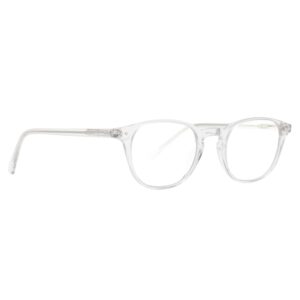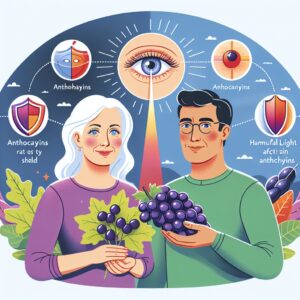
The Powerhouse of Eye Health: Vitamin C’s Essential Role
When it comes to safeguarding your vision as you age, Vitamin C should be a key player in your diet. This vital nutrient is a cornerstone of eye health, acting as a protective agent against the wear and tear that comes with the years. It’s not just about seeing better today; it’s about ensuring that your eyes remain sharp and responsive well into the future.
Accelerating Antioxidant Action Against Aging Eyes
Antioxidants are like the body’s personal defense team against damage, and Vitamin C is one of the most powerful. It combats the harmful effects of free radicals, which can lead to age-related macular degeneration and cataracts. By neutralizing these unstable molecules, Vitamin C helps keep the eyes’ cells healthy and functioning optimally.
Understanding Vitamin C Levels and Visual Vitality
Maintaining the right levels of Vitamin C is crucial for visual health. But how much is enough? The recommended daily intake varies by age and gender, but a consistent supply is key. Without adequate Vitamin C, the eyes can’t repair themselves effectively, leaving them more susceptible to the effects of aging.
Why Your Peepers Need Vitamin C
It’s no secret that Vitamin C is a health powerhouse, but its benefits for the eyes are especially worth noting. This nutrient is involved in many aspects of eye function, from the health of blood vessels in your eyes to the proper functioning of retinal cells. Let’s break down why your peepers need this vital vitamin.
The Vision-Vital Nutrient: More Than Just an Immune Booster
Often celebrated for its immune-boosting properties, Vitamin C’s role in vision is equally impressive. It supports the health of ocular blood vessels and combats oxidative stress, a key factor in age-related vision decline. This nutrient is a multi-tasker, keeping your eyes resilient against the challenges they face every day.
Navigating Age-Related Vision Challenges with a Citrus Sidekick
As we age, our eyes face a myriad of challenges, from reduced blood flow to increased risk of conditions like cataracts and macular degeneration. Vitamin C acts as a trusty sidekick, supporting the eyes’ natural defenses and promoting repair and regeneration. Think of it as a daily dose of armor for your aging eyes.
Eye-Opening Evidence: Research Sheds Light on Vitamin C
Let’s look at the evidence. A wealth of research has been conducted on Vitamin C and its impact on eye health. These studies offer compelling proof of the nutrient’s protective role and its potential to slow down the progression of age-related vision issues.
Decoding the Age-Related Eye Disease Study (AREDS)
The Age-Related Eye Disease Study, commonly known as AREDS, is a major clinical trial that has shed light on the role of vitamins, including Vitamin C, in eye health. The findings? High levels of antioxidants, including Vitamin C, can reduce the risk of developing advanced age-related macular degeneration by about 25%. That’s a significant statistic that underscores the importance of this nutrient in our daily diet.
From Clinical Trials to Real-World Results: Vitamin C’s Efficacy
But it’s not just in the controlled environment of clinical trials where Vitamin C shines. Real-world results echo the findings of AREDS. People who maintain a diet rich in Vitamin C often report better vision clarity and a decrease in the progression of age-related eye conditions. These outcomes highlight the real-life benefits of this essential vitamin.
Seeing the Signs: How to Spot Vitamin C’s Impact
So, how can you tell if Vitamin C is working its magic on your eyes? It’s not always about dramatic changes; often, it’s the subtle signs of stability and health that signal its impact. Consistent intake of Vitamin C can lead to a noticeable difference in the way your eyes feel and perform.
Connecting the Dots: Symptoms of Vitamin C Deficiency on Vision
If your body is running low on Vitamin C, your eyes may be among the first to raise the alarm. Symptoms of deficiency can include blurry vision, difficulty seeing at night, and a greater susceptibility to developing cataracts. Recognizing these signs can help you take action to replenish this crucial nutrient.
When to Consider a Vitamin C Supplement for Your Eyes
While a balanced diet is the best way to get your Vitamin C, sometimes you may need an extra boost. If you’re noticing signs of deficiency or if you’re at a higher risk for age-related eye conditions, a supplement might be a good idea. Always consult with a healthcare professional before starting any new supplement regimen to ensure it’s right for you and your eyes.
Feeding Your Sight: Best Foods for Vitamin C Intake
Your diet is a direct line to better eye health, and when it comes to Vitamin C, the options are both delicious and diverse. Integrating a variety of Vitamin C-rich foods into your meals can help you maintain optimal eye health and potentially ward off age-related vision decline.
The Rainbow Diet: Colorful Produce for Healthy Vision
Imagine your plate as a canvas painted with the colors of the rainbow. Each hue represents a different nutrient your eyes need to stay healthy. For Vitamin C, think of vibrant oranges, reds, and greens. Citrus fruits, strawberries, bell peppers, and leafy greens are just a few options that can brighten your plate and fortify your vision.
- Oranges, lemons, and grapefruits
- Strawberries, raspberries, and blueberries
- Red and green bell peppers
- Kale, spinach, and broccoli
- Tomatoes and tomato juice
- Sweet potatoes and carrots
- Mangoes, papayas, and kiwis
Meal Planning with Eye Health in Mind
When you’re planning your meals, think about including at least one source of Vitamin C in every dish. A spinach salad with strawberries and citrus vinaigrette for lunch, or a stir-fry with bell peppers for dinner, can both be delicious and beneficial for your eyes. It’s all about making conscious choices that support your vision.
Optimizing Eye Health: Recommended Vitamin C Intake
To truly harness the power of Vitamin C for your eyes, you need to know how much your body requires. The right amount can help maintain the health of your eyes, but it’s important to tailor your intake to your individual needs and lifestyle.
How Much is Enough? Striking the Right Balance for Vision
The recommended daily allowance (RDA) of Vitamin C varies by age, gender, and life stage. For most adults, the RDA is between 75-90 milligrams per day. However, if you’re at risk for eye conditions or you’re already experiencing vision decline, your needs may be higher. It’s about finding the balance that keeps your eyes bright and clear.
- Men: 90 mg/day
- Women: 75 mg/day
- Pregnant women: 85 mg/day
- Breastfeeding women: 120 mg/day
- Smokers: An additional 35 mg/day (due to oxidative stress)
Navigating Supplements: Dosage and Safety Considerations
While getting your Vitamin C from foods is ideal, supplements can be a practical choice for some. But before you start, it’s important to consider the right dosage and potential safety concerns. Excessive intake can lead to issues like gastrointestinal discomfort, so it’s crucial to stick to recommended levels or seek guidance from a healthcare provider.
- Choose reputable brands that have been third-party tested.
- Be aware of the upper intake level (UL) for adults: 2,000 mg/day.
- Discuss with your doctor if you’re taking other medications.
- Consider your total Vitamin C intake, including both food and supplements.
- Monitor your body’s response to the supplement and adjust as needed.
Squeezing Out Benefits: Tips for Boosting Daily Vitamin C
Maximizing your Vitamin C intake doesn’t require a complete diet overhaul. With a few smart tweaks and conscious choices, you can significantly increase the amount of this vital nutrient in your daily meals. Let’s explore some practical ways to squeeze out every drop of benefit from Vitamin C for your eye health.
Simple Swaps for a Vitamin-Charged Diet
Small changes can lead to big results when it comes to your Vitamin C intake. Start by swapping out snacks like chips or cookies for fresh fruits like oranges or kiwi slices. Choose a side salad with leafy greens over fries, and add a squeeze of lemon to your water or tea for an extra burst of this essential nutrient.
- Trade your morning pastry for a grapefruit or a smoothie with berries.
- Opt for a salad with a variety of colorful veggies as one of your meals.
- Snack on raw bell peppers with hummus instead of processed snacks.
- Use cauliflower rice as a base for your dishes to boost Vitamin C.
- Add strawberries or orange slices to your yogurt or cereal.
Keeping an Eye on Hydration and Vitamin C Absorption
Hydration plays a key role in the absorption of Vitamin C. Water not only helps transport nutrients throughout your body but also assists in keeping the eyes moist and comfortable. Aim to drink plenty of fluids throughout the day to ensure your body can effectively use the Vitamin C you consume.
Remember, while supplements can be helpful, getting Vitamin C from natural food sources is best. Foods come with a host of other beneficial nutrients that all work together to support your health. Plus, it’s hard to beat the taste of a fresh, juicy orange or a handful of sweet berries!
Article-at-a-Glance: Key Takeaways on Vitamin C and Vision
Before we wrap up, let’s recap the key points we’ve covered about Vitamin C and its crucial role in maintaining healthy vision as we age:
- Vitamin C is a powerful antioxidant that protects the eyes from damage caused by free radicals.
- Adequate Vitamin C intake is associated with a reduced risk of age-related macular degeneration and cataracts.
- Symptoms of Vitamin C deficiency can include blurry vision and difficulty seeing at night.
- Incorporating a variety of Vitamin C-rich foods into your diet can help maintain optimal eye health.
- Hydration is important for Vitamin C absorption and overall eye health.
Frequently Asked Questions
Got questions? You’re not alone. Here are some of the most common queries people have about Vitamin C and eye health:
Can Vitamin C cure existing eye conditions?
While Vitamin C is essential for eye health, it’s not a cure-all for existing conditions. It can, however, play a supportive role in managing symptoms and slowing progression. Always consult with an eye care professional for guidance on treating eye conditions.
Remember, the goal is to maintain a diet rich in Vitamin C to support eye health and prevent issues before they start. If you’re concerned about your eye health or have an existing condition, it’s crucial to work with your healthcare provider to create a plan that’s tailored to your needs.
Keep these insights in mind as you consider the role of Vitamin C in your diet. With the right information and some simple adjustments, you can give your eyes the nutritional support they need to stay sharp and clear for years to come.
Are there any risks associated with high Vitamin C intake?
Like with anything, too much of a good thing can be harmful. High doses of Vitamin C can lead to side effects such as stomach upset, diarrhea, and kidney stones. The key is to stick to the recommended daily amount and not go overboard. If you’re considering higher doses, it’s best to consult with a healthcare provider.
How long does it take to see results from increasing Vitamin C intake?
Patience is a virtue when it comes to nutrition and health benefits. While some people may notice improvements in their overall health relatively quickly, changes in vision health from increased Vitamin C intake can take longer. Generally, it might take a few months of consistent, adequate intake to notice changes in eye health.
What are the best forms of Vitamin C for eye health?
The best form of Vitamin C for eye health is the kind you’ll consistently consume. That means if you love oranges, they’re a great choice. If you prefer a supplement, that’s fine too, as long as it’s from a reputable source. The goal is to ensure steady Vitamin C intake for your eyes to reap the benefits.
Can children and teens benefit from Vitamin C for eye health?
Absolutely! Vitamin C is important for the development and maintenance of healthy eyes in children and teens. A diet rich in fruits and vegetables can help set the foundation for lifelong eye health. Just be sure to adjust the amount of Vitamin C to their age and nutritional needs.
As we close this chapter on Vitamin C and its role in maintaining eye health, let’s remember the simple truth: nutrition is a powerful tool in our wellness arsenal. By making smart, informed choices about our diet and supplement intake, we can protect and preserve our precious gift of sight. It’s not about quick fixes or miracle cures; it’s about consistent, daily actions that add up to a lifetime of clear vision.
So, let’s raise a glass of freshly squeezed orange juice to our eyes. Here’s to bright days ahead, full of vibrant colors and clear horizons, all thanks to the little vitamin that could—Vitamin C.


